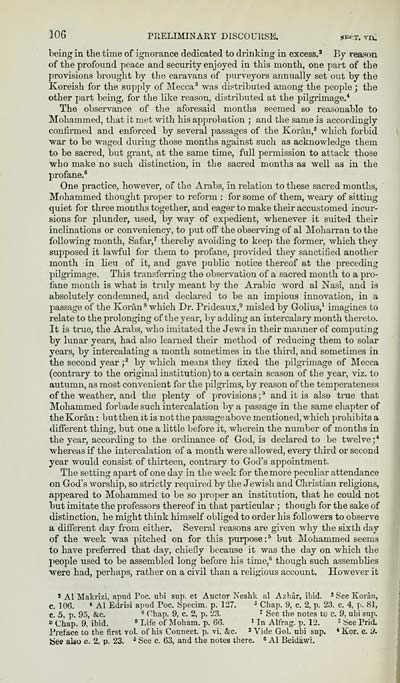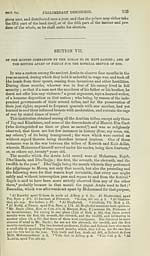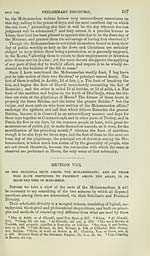Download files
Complete book:
Individual page:
Thumbnail gallery: Grid view | List view

"106 PRELIMINARY DISCOUKSK. sj^t. vn.
being in the time of ignorance dedicated to drinking in excess.* By reason
of the profound peace and security enjoyed in this month, one part of the
provisions brought hy the cai-avans of purveyors annually set out by the
Koreish for the supjdy of Mecca ^ was dit-tributed among the people ; the
other part being, for the like reason, distributed at the pilgrimage.*
The observance of tlie aforesaid months seemed so reasonable to
Mohammed, that it met with his approbation ; and the same is accordingly
confinned and enforced by several jiassages of the Koran,' which forbid
war to be waged during those months against such as acknowledge them
to be sacred, but grant, at the same time, full permission to attack those
who make no such distinction, in the sacred months as well as in the
profane.*
One practice, however, of the Arabs, in relation to these sacred months,
Mohammed thought proper to reform : for some of them, weary of sitting
quiet for three months together, and eager to make their accustomed incur-
sions for phmder, used, by way of expedient, whenever it suited their
inclinations or convcniency, to put off the observing of al Moharran to the
following month, Safar,^ thereby avoiding to keej) the former, which they
supposed it lawful for them to profiine, provided they sanctified another
month in Ueu of it, and gave public notice thereof at the preceding
pilgi'image. This transfen-ing the observation of a sacred month to a pro-
fane month is what is truly meant by the Arabic word al Nasi, and is
absolutely condemned, and declared to be an impious innovation, in a
passage of the Konln^ which Dr. Prideaux,^ misled by Golius,' imagines to
relate to the prolonging of the year, by adding an intercalary month thereto.
It is ti'uo, the Arabs, who imitated the Jews in their manner of computing
by lunar years, had also learned their method of reducing them to solar
years, by intercalating a month sometimes in the third, and sometimes in
the second year f by which means they fixed the pilgrimage of Mecca
(contrary to the original institution) to a certain season of the year, viz. to
autumn, as most convenient for the pilgi-ims, by reason of the temperateness
of the weatlier, and the plenty of provisions ; ^ and it is also trae that
Mohammed forbade such intercalation by a passage in the same chapter of
the Koran : but then it is not the passage above mentioned, which i)rohibits a
different thing, but one a little before it, wherein the number of months in
the year, according to the ordinance of God, is declared to be twelve;*
whereas if the intercalation of a month were allowed, every third or second
year would consist of thirteen, contrary to God's appointment.
The setting apart of one day in the week for the more peculiar attendance
on God's worship, so strictly required by the Jewish and Christian religions,
appeared to Mohammed to be so })roper an institution, that he could not
but imitate the professora thereof in that particular ; though for the sake of
distinction, he might think himself obliged to order his followers to observe
a different day from either. Several reasons are given why the sixth day
of the week was pitched on for this purpose:* but Mohammed seems
to have prefen*ed that day, chiefly because it was the day on which the
]»eople used to be assembled long before his time,'^ though such assemblies
were had, perhaps, rather on a civil than a religious account. However it
» Al Makrizi, apiid Poc. ubi sup, et Auctor Neshk al Azhar, ibid. ' See Koran,
c. 106. * Al Edrisi apud Poc. Specim. p. 127. * Chap. 9, c. 2, p. 23. c. 4, p. 81,
c. 5, p. 95, &c. ® Chap. 9, c. 2, p. '23. '' See the notes to c. 9, ubi sup.
»* Chap. 9, ibid. ' Life of Moham. p. 66. ^ In Alfrag. p. V2. - See Prid.
Preface to the first vol. of his Connect, p. vi. &c. ' Vide Gol. ubi sup. * Kor. c J.
bee also c. 2. p. 23. * See c. 63, and the notes there. * Al Beidawi.
being in the time of ignorance dedicated to drinking in excess.* By reason
of the profound peace and security enjoyed in this month, one part of the
provisions brought hy the cai-avans of purveyors annually set out by the
Koreish for the supjdy of Mecca ^ was dit-tributed among the people ; the
other part being, for the like reason, distributed at the pilgrimage.*
The observance of tlie aforesaid months seemed so reasonable to
Mohammed, that it met with his approbation ; and the same is accordingly
confinned and enforced by several jiassages of the Koran,' which forbid
war to be waged during those months against such as acknowledge them
to be sacred, but grant, at the same time, full permission to attack those
who make no such distinction, in the sacred months as well as in the
profane.*
One practice, however, of the Arabs, in relation to these sacred months,
Mohammed thought proper to reform : for some of them, weary of sitting
quiet for three months together, and eager to make their accustomed incur-
sions for phmder, used, by way of expedient, whenever it suited their
inclinations or convcniency, to put off the observing of al Moharran to the
following month, Safar,^ thereby avoiding to keej) the former, which they
supposed it lawful for them to profiine, provided they sanctified another
month in Ueu of it, and gave public notice thereof at the preceding
pilgi'image. This transfen-ing the observation of a sacred month to a pro-
fane month is what is truly meant by the Arabic word al Nasi, and is
absolutely condemned, and declared to be an impious innovation, in a
passage of the Konln^ which Dr. Prideaux,^ misled by Golius,' imagines to
relate to the prolonging of the year, by adding an intercalary month thereto.
It is ti'uo, the Arabs, who imitated the Jews in their manner of computing
by lunar years, had also learned their method of reducing them to solar
years, by intercalating a month sometimes in the third, and sometimes in
the second year f by which means they fixed the pilgrimage of Mecca
(contrary to the original institution) to a certain season of the year, viz. to
autumn, as most convenient for the pilgi-ims, by reason of the temperateness
of the weatlier, and the plenty of provisions ; ^ and it is also trae that
Mohammed forbade such intercalation by a passage in the same chapter of
the Koran : but then it is not the passage above mentioned, which i)rohibits a
different thing, but one a little before it, wherein the number of months in
the year, according to the ordinance of God, is declared to be twelve;*
whereas if the intercalation of a month were allowed, every third or second
year would consist of thirteen, contrary to God's appointment.
The setting apart of one day in the week for the more peculiar attendance
on God's worship, so strictly required by the Jewish and Christian religions,
appeared to Mohammed to be so })roper an institution, that he could not
but imitate the professora thereof in that particular ; though for the sake of
distinction, he might think himself obliged to order his followers to observe
a different day from either. Several reasons are given why the sixth day
of the week was pitched on for this purpose:* but Mohammed seems
to have prefen*ed that day, chiefly because it was the day on which the
]»eople used to be assembled long before his time,'^ though such assemblies
were had, perhaps, rather on a civil than a religious account. However it
» Al Makrizi, apiid Poc. ubi sup, et Auctor Neshk al Azhar, ibid. ' See Koran,
c. 106. * Al Edrisi apud Poc. Specim. p. 127. * Chap. 9, c. 2, p. 23. c. 4, p. 81,
c. 5, p. 95, &c. ® Chap. 9, c. 2, p. '23. '' See the notes to c. 9, ubi sup.
»* Chap. 9, ibid. ' Life of Moham. p. 66. ^ In Alfrag. p. V2. - See Prid.
Preface to the first vol. of his Connect, p. vi. &c. ' Vide Gol. ubi sup. * Kor. c J.
bee also c. 2. p. 23. * See c. 63, and the notes there. * Al Beidawi.
Set display mode to: Large image | Transcription
Images and transcriptions on this page, including medium image downloads, may be used under the Creative Commons Attribution 4.0 International Licence unless otherwise stated. ![]()
| Early Gaelic Book Collections > J. F. Campbell Collection > Koran: or, Alcoran of Mohammed > (128) |
|---|
| Permanent URL | https://digital.nls.uk/77135503 |
|---|
| Description | Volumes from a collection of 610 books rich in Highland folklore, Ossianic literature and other Celtic subjects. Many of the books annotated by John Francis Campbell of Islay, who assembled the collection. |
|---|
| Description | Selected items from five 'Special and Named Printed Collections'. Includes books in Gaelic and other Celtic languages, works about the Gaels, their languages, literature, culture and history. |
|---|

